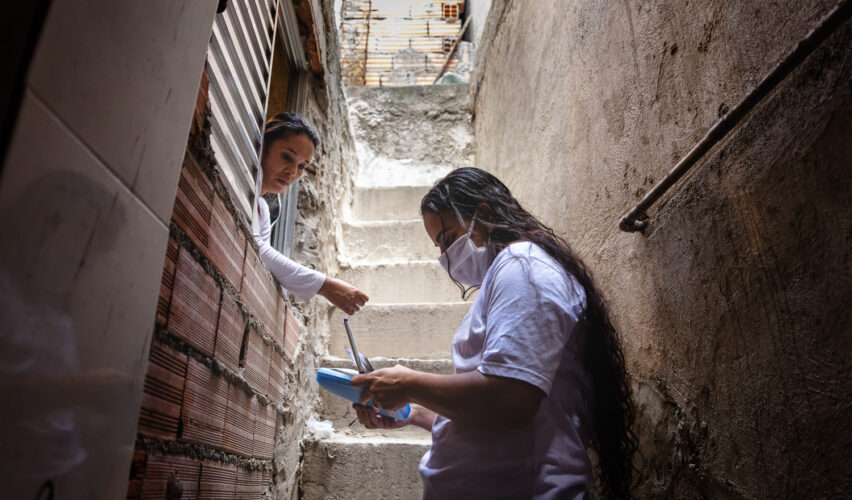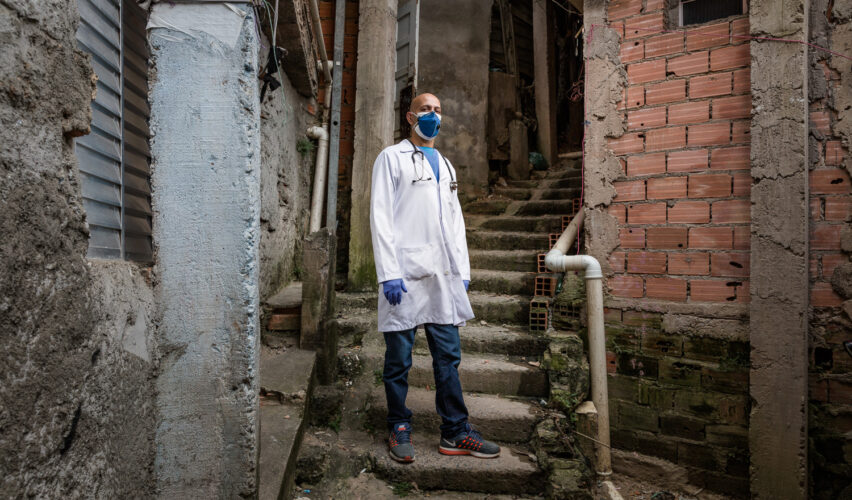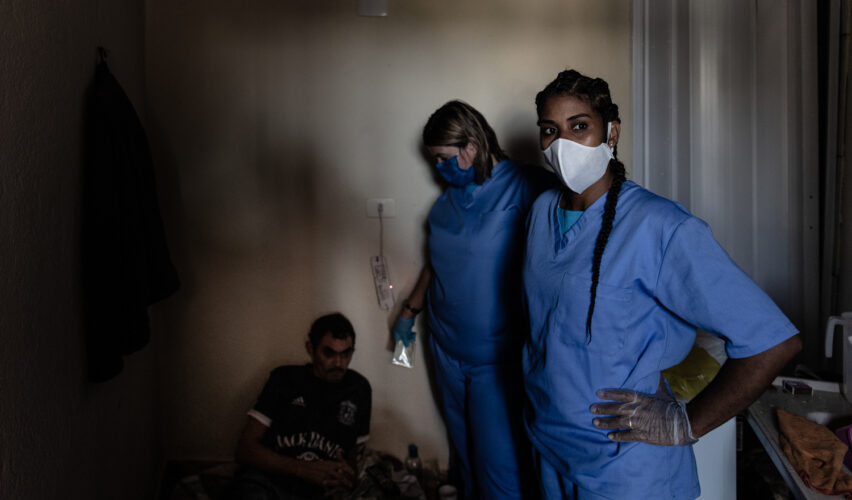Residents of Paraisópolis, in São Paulo, join forces to provide ambulances, emergency food supplies, and face masks to aid Covid-19 victims

“We feel abandoned. It’s like we’re not Brazilians. Forgotten”. Gilson Rodrigues is getting it off his chest. He is a community representative in São Paulo’s second largest favela, Paraisópolis, in the city’s south side. Rodrigues is adamant in revealing the government’s lack of concern with the poorest areas of the city in the midst of the pandemic. But this community did much more than being righteously outraged. The residents of Paraisópolis came together. And they showed, once again, that the favela can only rely on itself. It is like the old saying goes, “Nós por nós” or “For us, by us”.
Leia também: Como Heliópolis, maior favela de SP, luta contra o coronavírus e a perda de renda

Unity. That’s the word which better embodies the present moment in Paraisópolis. Its residents don’t want to show up in the news because of yet another tragedy. Not six months after nine teenagers and young adults were trampled and died during a violent operation by the São Paulo State Military Police (PM) to disperse a baile funk, a very big block party. And five months after three teenagers were kidnapped and murdered in the favela, they don’t want to appear once again in the news because of tragedy and so, they mobilized to try to avoid the chaos caused by the pandemic.

The way they organize is simple: each street has a representative, called president. He’s responsible for up to 50 families, to better handle the resources and aid to the population. The presidents manage the delivery of emergency food supplies, call ambulances for the sick and refer those who need housing to emergency shelter.
“We call our volunteer manager a president for a reason. We need our own president, since the elected representatives are absent during the pandemic”, Gilson says. “All that we have done comes from the favela. Nothing from the government. The only thing São Paulo state government has done for us is letting us use the school. There’s a lack of public policies. They are creating a tragedy”.

An elderly woman, who lives in the favela, received aid from the community | Photo: Gui Christ/National Geographic
To avoid tragedy, the residents of Paraisópolis are distributing packed lunch meals and producing and delivering face masks to their fellow residents. They have also hired health professionals to meet the local population’s demands, along with three ambulances. They turned local schools into emergency shelters and handed out food supplies to those who need them the most.

Photo of a resident, who protects himself with a mask | Photo: Gui Christ/National Geographic
All this mobilization makes for a busy day’s work for those involved. Last Wednesday, on May 6, for example, a group of 250 volunteers graduated from a first aid course. After receiving their certificates, they were sent back to other activities. There’s no time to waste.
 Training at a school for volunteers | Photo: Gui Christ/National Geographic
Training at a school for volunteers | Photo: Gui Christ/National Geographic
The photographer Guilherme Christ followed up close the work in the favela’s streets and alleys and was stunned by the complete absence of government officials there, who should be responsible for the aid. “What I found most impressive was the unity, the power that Gilson has to engage the community and bring them together as one”, he said.

Fausto Viana at his terrace in Paraisópolis l Photo: Gui Christ/National Geographic
His images reflect their joint efforts, this rather unique collective empathy to deal with what is going on. Even though many of the residents don’t honor the quarantine. “Many people still don’t understand what is Covid-19. Not to say anything about the government, which is doing whatever it can to bamboozle the population, saying that ‘it’s only a little flu’. Many people are toying with this disease or are too embarrassed to take action and call out their neighbours”, he said. “It was like a social taboo”.
Without meat in her fridge, caretaker helps others like her
Empathy. That is, indeed, an important word for those who embrace the ideas and actions that are being conducted locally. To feel the pain of another human being is often more important than facing your own problems or the uncertainty of the future. That’s the case of Cláudia Regina di Silvério, who is 48 years old and lived 18 of them in Paraisópolis. She’s one of the people responsible for making sure that alcohol gel, masks and food reach those who need them the most.

Classrooms are now housing those who are infected | Photo: Gui Christ/National Geographic
Mother of three, ages 9, 10 and 23, she takes care of the elderly at Nova Street. Many of them count with the solidarity of their neighbours to make it through. Sons, grandchildren and other relatives have abandoned them. During the pandemic, they rely on people like Cláudia.
Leia também: Raull Santiago: ‘Na pandemia, descaso do governo impacta mais a favela’
Born in Santos, a coastal city near São Paulo, Claudia arrived in Paraisópolis driven by passion. “I found love”, she remembers. Now, after two decades, she makes her living taking care of children – and not only her own. Before the pandemic, she used to take care of nine of them to make ends meet. Now, only one of them is left – since the child’s parents still have to work through Covid-19. Her livelihood disappeared in a matter of weeks.
“I received the R$ 1,200 reais aid from the federal government. Out of that, I used R$ 550 to pay rent, a few bills, bought some supplies and then it was all gone. I will receive the next payment on the 25th. It’s not easy”, she confesses. In addition to her caretaking job, she used to sell cakes to earn a few extra reais. Since there aren’t any parties anymore, sales are down. Still, she cares about other people’s pains and struggles.

Preparation of the packed lunches distributed in Paraisópolis | Photo: Gui Christ/National Geographic
“I’m tending to the family of a father, his nephew and three children, who were abandoned by their mother. The father leaves for work at 04:30am and they wait for the volunteers to arrive with lunch. They don’t eat breakfast. I cry every night, you know? I think of them… it gets me really emotional”, she says, knowing that her life is far from being easy.
“We don’t eat meat anymore at our home. My older son had his wages reduced. But we keep pushing on and moving forward”, she admits. “I can’t explain. There’s so much going on that sometimes you look at your trials and tribulations and they pale in comparison to what so many people are going through. They seem small”.
Leaving her problems temporarily aside to help others, sharing their realities, inspires Cláudia to look at life with a more optimistic and humane gaze. “Everybody helps the families. People are so grateful. The elderly are so grateful as well, since they feel so lonely, abandoned. We want to help even more, but sometimes we can’t. It ‘s not easy”.
General view of the Paraisópolis favela, the second largest in São Paulo | Photo: Gui Christ / National Geographic
This photographic essay was funded by the National Geographic Society Emergency Fund for Journalists
Translation: Pedro Ribeiro Nogueira / Proofreading: Juan Carlos Urbina


[…] [1] http://ponte.org/favela-cria-seus-proprios-presidentes-para-combater-o-coronavirus/ […]
[…] [1] http://ponte.org/favela-cria-seus-proprios-presidentes-para-combater-o-coronavirus/ […]